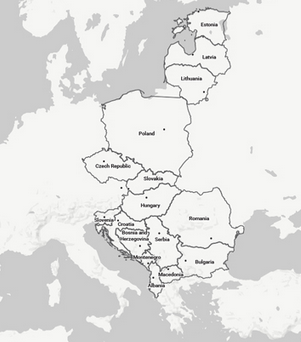Tag: Budapest
Cina. Sta colonizzando l’Europa dell’Est e l’Unione si strappa i capelli.
Giuseppe Sandro Mela.
2017-12-04.
Se fu notevolmente irritante essere presi per matti quando trenta anni or sono si parlava delle potenzialità cinesi, alle quali nessuno all’epoca voleva credere, tornò invece di grande utilità quando dopo una decina di anni la presenza della Cina divenne evidente, ed allora iniziarono a fioccare le consulenze previsionali.
L’occidentale medio, ed anche molti dei suoi politici, continuano a vivere in una crassa ignoranza di cosa sia e rappresenti la Cina, e di come essa agisca: è troppo fuori dai loro schemi mentali. In molti stentano financo a comprendere come essa sia oramai la maggiore potenza mondiale.
Cina. Mandarinato e democrazia. – Handelsblatt
Cina prima potenza economica mondiale. – Bloomberg
Per lo più, serve che accada un qualcosa che richiami fortemente l’attenzione, che obblighi alla constatazione del dato di fatto: senza la percezione del reale resta impossibile poi avere gli elementi corretti sui quali pensarci sopra.
Cina. BeiDou. La via digitale della seta. Il dominio del mondo.
Cina. Inizia a rendere pan per focaccia. Siete avvisati.
Per quanto possa sembrare essere strano, l’Occidente è rimasto più scosso dal fatto che la Cina abbia negato a Mrs Gigi Hadid il visto di ingresso per motivi religiosi che non dalla constatazione di quanto grandiosamente gigantesco sia il progetto Belt and Road.
Cina. Belt & Road. Investimenti in aumento.
Two strategies benefits both China and the world
China’s Belt and Road plan ‘open’ to all nations
The State Council. The People Republic of China. The Belt and Roads Initiative.
*
Se tuttavia l’impianto economico del Belt and Roads alla fine risulterebbe essere capibile almeno parzialmente, l’Occidentale medio non riesce minimamente a comprendere quale sia la chiave del successo.
Un ladro ragiona da ladro e parte dal presupposto che tutti rubino: gli resta inconcepibile che possano esistere persone oneste.
La ‘casa’ di Shanghai. Capire cosa sia la Cina di oggi.
«La Cina è la Cina: non rientra nelle categorie mentali occidentali.»
Cina. Consolida il suo impero in Africa.
Cina ed Africa. Una politica di rapporti internazionali paritetici.
«China’s popularity in Africa is strong. Its policy of not linking aid and investments to human rights and good governance has made Beijing many friends on the continent, beyond its authoritarian governments»
Questo è il cuore della questione.
La Cina è benvoluta perché tende ad instaurare rapporti bilaterali paritetici, basati sul pilastro della non ingerenza negli altrui problemi interni.
Gli unici Occidentali che contano e che abbiano capito cosa stia accadendo sembrerebbero essere Mr Donald Trump e la Confindustria tedesca. Questa scrive a chiare lettere:
«Contrary to the beliefs of many people here, the West’s political model is not universally accepted in the rest of the world».
Si potrebbe anche aggiungere che il resto del mondo non accetta il modello occidentale perché inconsistente ed iniquo. A parte il fatto che genera instabilità politica. Si veda cosa sta succedendo nella grande Germania.
Fondamentale la posizione assunta da Mr Macron.
«I believe in the sovereignty of states, and therefore, just as I don’t accept being lectured on how to govern my country, I don’t lecture others».
* * * * * * *
L’Occidente, e massimamente l’Unione Europea, avevano sempre condizionato la concessione di aiuti economici alla accettazione della propria Weltanschauung.
*
Kenya President Uhuru Kenyatta clashes with President Obama on LGBT equality: ‘Gay rights is really a non-issue’
«President Barack Obama had been warned by African politicians and religious leaders to avoid the issue of gay rights during his trip to the continent, arguing that any pro-LGBT rights stance would be met with disapproval.
Yet the 44th President of the United States has made LGBT rights a strong part of his second term in office after he became the first sitting US president to publicly favour gay marriage in 2012 and then referencing the Stonewall riots in his 2013 inauguration speech.
At a press conference with the Kenyan President Uhuru Kenyatta, Mr Obama spoke movingly about the cause of gay rights, comparing the plight of homosexuals to the battle against slavery and segregation in the USA. He said he was “painfully aware of the history when people are treated differently under the law. …. However, despite Mr Obama’s stance on the issue, Mr Kenyatta resolutely stuck to his line on the cause of LGBT rights»
*
Merkel. Una gran brutta figuraccia in Arabia Saudita.
«German Chancellor Merkel has arrived in the Saudi port city of Jeddah to hold talks with the kingdom’s authorities. Women’s rights are high on her agenda following massive criticism of Riyadh’s UN women’s body role. …. dedicated to the promotion of gender equality and the empowerment of women. has raised fears that German arms were being misused»
Non ci si stupisca della risposta datale dal Re Saudita:
«We will not cause any more problems for the German government with new requests for weapons».
Gli arabi non hanno voluto diventare femministi, né tanto meno diversamente ed alteramente senzienti (leggasi, checche impenitenti). Il Re saudita proprio non ne volle sapere di dimettersi, far venire al suo posto una femmina, e mettersi a fare il pervertito: più semplicemente ha eliminato Frau Merkel, precedendo così di poco l’elettorato tedesco.
* * * * * * *
Orbene, la Germania, o meglio i resti di ciò che fu la Germania dopo il governatorato Merkel, e l’Unione Europea guidata da Mr Juncker e da Mr Tusk vorrebbero imporre la propria Weltanschauung a Polonia ed Ungheria.
Questo genera forti tensioni, anche perché i paesi del Visegrad sono incardinati nella Nato ed hanno scambiato la presenza di militari ed armamenti sul proprio territorio per consistenti aiuti economici.
Aiuti economici che però l’Unione Europea condiziona all’accettazione dei propri desiderata: tutti atei, lgbt, tremebondi ed ossequiosi di fronte alle corti di giustizia liberal europee, cordiali ospiti delle ogn (ngo) di Mr Soros.
* * * * * * *
Ma mentre l’Unione Europea si balocca con cose futili quali le scale valoriali delle fu Frau Merkel, la Cina, e con lei la Russia, hanno varato il progetto Ceec, che si integra alla perfezione con quello Belt and Rod.
Cina. Ceec, un nome da imparare. Dazi ridotti dal 17.3% al 7.7%.
«The 16+1 format is an initiative by the People’s Republic of China aimed at intensifying and expanding cooperation with 11 EU Member States and 5 Balkan countries (Albania, Bosnia and Herzegovina, Bulgaria, Croatia, the Czech Republic, Estonia, Hungary, Latvia, Lithuania, Macedonia, Montenegro, Poland, Romania, Serbia, Slovakia, Slovenia) in the fields of investments, transport, finance, science, education, and culture. In the framework of the initiative, China has defined three potential priority areas for economic cooperation: infrastructure, high technologies, and green technologies.» [Fonte]
*
Cooperation between China and Central and Eastern European Countries.
«- Chinese premier pledges to enhance cooperation with Hungary
– Chinese premier announces financing support for 16+1 cooperation
– Chinese Premier’s Upcoming Visit Conducive to Cooperation with CEE, SCO countries»
* * * * * * *
Bene. Adesso la Cina non è lontana: adesso confina con la Germania.
Polonia ed Ungheria hanno un interscambio commerciale con la Cina tre volte maggiore che con la Unione Europea.
Al summit di Budapest, il Primo Ministro Li Keqiang ha assistito compassato al pontificale, rendendo onore ai Martiri ungheresi.
L’Unione Europea, ossia la sua fatiscente dirigenza, inizia a comprendere qualcosa.
«Berlin, Brussels and Washington might worry as they watched eastern European states and China hold a major summit this week»
*
«Beijing’s influence is the result of the EU’s own discord»
*
«Hungary and some of its neighbors, like Serbia, are getting promises of new infrastructure and are set to play a key role in China’s new “One Belt, One Road” initiative, a vast $900-billion infrastructure project stretching all the way from Asia to Europe»
*
«Investment is hardly a bad thing, but the political ramifications are providing bigger headaches in other capitals»
*
«Berlin and Brussels fear that China’s economic prowess could loosen their own influence, driving a further wedge in an already-strained relationship between some western and eastern EU members»
*
«The EU is allowing Beijing to undermine the bloc»
*
«There’s a perception that the European Union neglects its eastern member states, which makes officials in such countries all the more grateful for China’s lucrative investment programs»
*
«China’s investments in Eastern Europe contain the danger of a deepening division within the EU …. There is not only a danger — the division is already deep»
*
«China’s credit-based investment aid not has not only elicited gratitude, but has also created political allies to help the country further expand its influence»
*
«Central European leaders such as Czech President Milos Zeman or Hungarian Prime Minister Viktor Orban are open about their admiration for China’s authoritarian governmental system and welcome the fact that — in contrast to decrees from Brussels and Berlin — Beijing does not lecture them on the rule of law, democracy and refugee policy»
*
«The European Union should put more effort into driving its own infrastructure projects, such as the West Balkan road and energy networks that were announced as part of the Berlin Process. Countries that seek to join the European Union»
*
«The European Union is too slow, too divided, and has increasingly less money»
*
«An EU alternative?»

